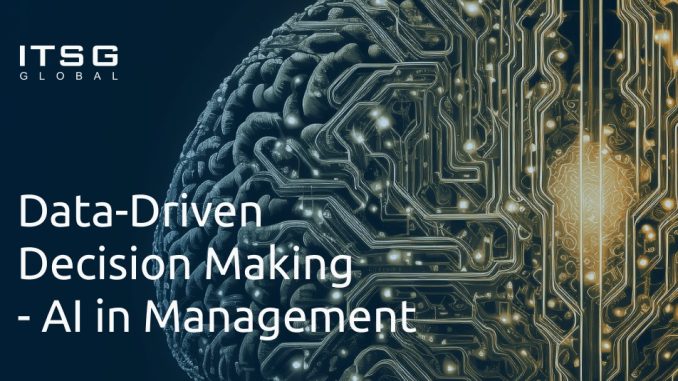
In an increasingly complex and competitive global landscape, the ability to make informed, timely, and accurate decisions has become a cornerstone of success for businesses, governments, and organizations of all kinds. For decades, “data-driven decision making” has been a guiding principle, emphasizing the use of empirical evidence rather than intuition or guesswork. However, the sheer volume, velocity, and variety of data generated today far exceed human analytical capabilities. This is where Artificial Intelligence (AI) steps in, profoundly impacting and enhancing data-driven decision-making, transforming it from a human-intensive process into a highly automated, predictive, and prescriptive one.
At its core, AI’s influence stems from its unparalleled ability to process and interpret vast datasets at speeds impossible for humans. Traditional data analysis, even with sophisticated business intelligence tools, often relies on retrospective views and requires significant manual effort for data collection, cleaning, and preparation. AI, through machine learning algorithms, automates these tedious yet crucial steps. It can swiftly ingest data from diverse sources – internal databases, external market feeds, social media, IoT sensors, and more – and then clean, normalize, and structure it for analysis. This automation dramatically reduces the time from data inception to insight generation, providing decision-makers with fresh, relevant information rather than relying on potentially outdated reports.
One of the most powerful contributions of AI to data-driven decision-making is its enhanced predictive analytics capabilities. While humans can identify trends from historical data, AI algorithms can go much deeper, uncovering subtle patterns, correlations, and anomalies that are often invisible to the human eye. By analyzing these complex relationships within vast datasets, AI can forecast future trends with remarkable accuracy. Consider a retail business: AI can predict customer buying patterns by analyzing past purchases, Browse behavior, demographic data, and even external factors like weather or economic indicators. This predictive power allows businesses to make proactive decisions on inventory management, optimize supply chains, personalize marketing campaigns, and even anticipate shifts in market demand. The ability to foresee potential outcomes reduces uncertainty and enables more strategic and effective planning.
Beyond prediction, AI also provides real-time insights, enabling quicker and more agile responses to dynamic market conditions. In fast-paced environments like financial trading, supply chain management, or real-time customer service, delays in decision-making can lead to significant losses or missed opportunities. AI systems can continuously monitor live data streams, flagging critical events or anomalies as they occur. For example, in a manufacturing plant, AI can detect a slight deviation in machinery performance in real-time, alerting operators to potential issues before they escalate into costly breakdowns. Similarly, in e-commerce, AI can analyze real-time customer behavior on a website and dynamically adjust product recommendations or pricing to optimize conversions. This capacity for instant insight empowers decision-makers to react swiftly and decisively, maintaining a competitive edge.
Furthermore, AI significantly reduces human bias and enhances the objectivity and consistency of decisions. Human decision-making is inherently susceptible to cognitive biases, emotional influences, and inconsistencies stemming from fatigue or individual judgment calls. AI, conversely, operates purely on data and predefined algorithms, ensuring that decisions are made based on objective patterns and logical rules. While humans still play a crucial role in setting the parameters and interpreting the results, AI provides a consistent and unbiased analytical foundation. This consistency is particularly valuable in areas like loan approvals, fraud detection, or quality control, where equitable and reliable outcomes are paramount. For example, AI-powered fraud detection systems can analyze millions of transactions, identifying suspicious patterns that would be impossible for human analysts to spot, leading to faster and more accurate prevention of financial crimes.
AI also democratizes access to data-driven insights. Historically, complex data analysis required specialized data scientists and analysts, creating bottlenecks in information dissemination. With AI-powered business intelligence (BI) tools and natural language processing (NLP) capabilities, non-technical users can now query data and receive actionable insights in plain language. A marketing manager might simply ask a question like, “Which marketing campaign had the highest ROI in Q1 among customers aged 25-34 in Southeast Asia?” and receive an instant, visualized answer. This self-service analytics empowers employees across all departments to make more informed decisions autonomously, fostering a data-centric culture throughout the organization and reducing reliance on centralized data teams.
However, the transformative power of AI in data-driven decision-making is not without its challenges. The quality of the input data is paramount; “garbage in, garbage out” remains a fundamental truth. Biased, incomplete, or inaccurate data fed into AI models will lead to flawed insights and misguided decisions. Therefore, robust data governance, cleansing, and validation processes are more critical than ever. Ethical considerations, including data privacy, algorithmic bias, and transparency, also demand careful attention. If AI models are trained on biased historical data, they can perpetuate and even amplify existing societal biases, leading to unfair or discriminatory outcomes. Ensuring explainability (“XAI”) – understanding how an AI reached a particular conclusion – is crucial for building trust and accountability, especially in high-stakes decision-making scenarios.
In conclusion, Artificial Intelligence is irrevocably changing the landscape of data-driven decision-making, moving businesses from reactive analysis to proactive and even prescriptive strategies. By automating data processing, enhancing predictive capabilities, providing real-time insights, reducing human bias, and democratizing access to information, AI empowers organizations to navigate complexity with unprecedented speed and accuracy. While careful attention to data quality, ethics, and human oversight remains essential, the symbiotic relationship between human expertise and AI’s analytical prowess is undoubtedly the future of effective decision-making in our data-rich world.